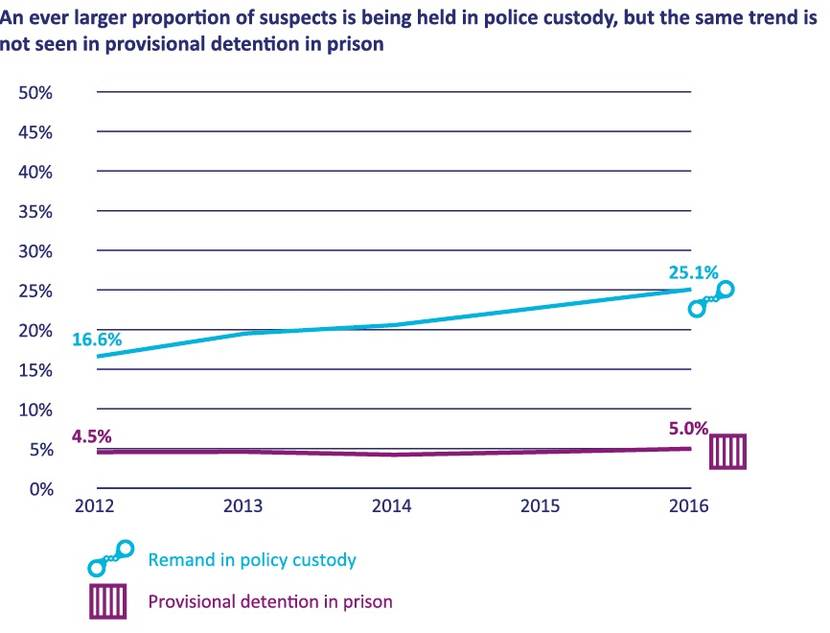Pre-trial detention: suspects in the cells
The Netherlands Court of Audit has investigated the figures behind the developments and trends in pre-trial detention. Did the Netherlands really apply pre-trial detention more than any other European country? How has the number of suspects in pre-trial detention changed in recent years? And why has the number of claims for damages risen so sharply?

International comparisons cannot be made: increase in short-term remand in police cells
We found that the claim that the Netherlands applied pre-trial detention more than any other country in Europe could be neither proven nor disproven. For a variety of reasons, it is not possible to make a meaningful quantitative international comparison based on the data currently available. The legal systems, definitions and data registration methods used in the various European countries often cannot be compared with each other.
It is more meaningful to study developments in our own country than to attempt a European comparison. We found that the percentage of suspects detained in police cells (i.e. remanded in police custody) for up to three days had risen from 17% to 25% of all suspects in the past five years. In 2016, some 67,000 suspects had been remanded in police custody. The percentage of crime suspects detained for a longer period in prison had remained fairly stable (around 4.5%). This means that an ever larger proportion of suspects is being released after a brief stay in a police cell. This does not mean they are no longer suspected, as the group also includes people who need not be detained while awaiting trial.

In 2016 about €8.7 million was paid out in damages to compensate former suspects for the time they had spent on remand. The number of damages claims paid out has risen sharply in recent years, mainly because of the increase in short-term detentions in police cells. The number of damages payments made to these people has increased six-fold in the past ten years. As a result, eight out of ten damages payments were made to this group of former suspects in 2016. Far more former suspects could have claimed damages; only about 35% of eligible suspects actually made a claim.
Debates in the House of Representatives, prompted largely by questions from MPs, have been concerned chiefly with longer-term provisional detention in prison cells rather than shorter-term remand in police custody.

Why did we audit developments in pre-trial detention?
It is regularly claimed that the Netherlands uses remand in police custody and provisional detention in prison, two forms of pre-trial detention, more often than other European countries. The country, it is even said, applies pre-trial detention more than any other country in Europe. Furthermore, the damages paid out on account of a pre-trial detention that does not lead to a prison sentence or other sanction has been rising for many years.

What standards and methods did we use in our audit of pre-trial detention?
Our analysis concentrated on the group of people who were eligible for damages in 2014. To measure the size of this group, we requested information from the police (how many people have been remanded in police custody?) and from the Public Prosecution Service (how many people have been provisionally detained in prison and how were their cases dealt with?). To this end, we linked the case numbers in the databases of the police and the Public Prosecution Service to each other. To determine whether those people had also claimed damages, we connected the case numbers to a database kept by the Council for the Judiciary. The Council for the Judiciary also keeps a separate system (NIAS) to record appeals. Unfortunately we were unable to link this system to the other three systems because the identification numbers used in NIAS differ from the case numbers. As a result, we had no insight into the appeal cases.

Current status
The Minister of Security and Justice responded to our draft report on 2 October 2017. He wrote that he had read the report with interest and appreciation.
The minister pointed out the difference between remand in police custody and provisional detention in prison. We agree with his comment that little attention has previously been paid to this distinction and we assume that he will clearly explain the difference in his communications with parliament.
We welcome the minister’s undertaking to study the causes of the relatively sharp increase (and possible recent decline) in the number of people remanded in police custody. We are pleased that our audit findings will be included in the study and expect the results to be shared with parliament.
We also welcome the minister’s undertaking to inform parliament more systematically in the future about both provisional detention in prison and remand in police custody. We think this will enable the minister to provide parliament with a clearly defined picture of both forms of pre-trial detention.